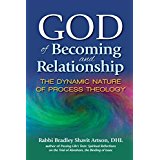What is evil?
In Process Thought, much of what we understand to be evil is seen as the very source of dynamism and life: events that are disasters for some are sources of emerging novelty and development for others.
So the process of evolution is driven precisely by a tension between limits, on the one hand, and possibilities, on the other. We cannot have one without the other.
Process theology offers two possible understandings of evil; both face the tragic nature of evil directly and affirm the innocence of those who suffer.
One Process approach addresses suffering and evil as that aspect of reality not yet touched by God’s lure, or that part of creation that ignores God’s lure.
Another Process approach acknowledges that much of what we term evil or suffering is a matter of perspective. And so the medieval Jewish philosopher Maimonides writes,
“Every ignoramus….imagines that all that is exists with a view to his individual sake; it is as if there were nothing that exists except him. And if something happens to him that is contrary to what he wishes, he makes the trenchant judgment that all that exists is an evil. (Guide of the Perplexed, see p. 169)
Most human suffering is not divine punishment or test, but the result of three broad realities of life.
The nature of being human: It is the nature of material reality to come into being, to grow and flourish for a time, and to then fall apart prior to going out of existence. The only alternative, a world of static eternity, is one that few of us would choose. (More importantly, we don’t have that choice.) Dynamism, hence suffering and death, is built into the very nature and logic of materiality. Thus Maimonides says:
“The first type of evil is that which befalls people because of the nature of coming-to-be and passing-away.”
Tyrannical domination: It is also possible to understand large swaths of suffering and evil as the result of the abuse of power. And so Maimonides says:
“The evils of the second kind are those that people inflict upon one another, such as tyrannical domination of some over others.”
We suffer the consequences of our own behavior: Our freedom to make poor choices also means that we inflict harm on ourselves whenever we can’t (or don’t) heed the divine lure. Maimonides again:
“The evils of the third kind are those that are inflicted upon any individual among us by his own action.”
Process Theology opens our eyes to a view of God as relational and loving.
The dynamic, ephemeral nature of becoming, the competing lures that tempt us and distract us from God’s lure, and the consequences of our choices on others and ourselves – these are all sources of suffering and evil. Process Theology allows us to recognize their sources within the natural world, and not as the judgment or punishment of the Divine. In turn, this realization allows us to continue to perceive God as our ally and source of strength in times of tribulation.
Do not fear, for I have redeemed you; I have called you by name, you are mine. When you pass through the waters, I will be with you; and through the rivers, they shall not overwhelm you; when you walk through fire you shall not be burned, and the flame shall not consume you. For I am the LORD your God… (Isaiah 43:1-3f)
“I am with you, declares the Holy One” (Haggai 1:13)
Artson writes, God is our ally and source of strength in times of tribulation…. God is relational and loving, working in, with, and through us to bring order to the chaos of our lives and societies, giving us the strength and insight to know how to struggle for health, connection, and justice. (p. 33)
When you have you found God to be your source of strength?
What favorite texts help you in times of tribulation?
Moving beyond thinking to action
Understanding God as the pervasive creativity and novelty that permeates all-becoming invites us to stop thinking about the status of evil and to focus instead on how we work for justice, well-being, and compassion.
Evil and suffering are not intriguing theological puzzles but existential goads, calling us to repair the world. This shift from intellectual justification to action has ancient precedent. The Rabbis perceive God as preferring righteous behavior to correct belief. …. If we are part of creation, and if we also have the ability to align ourselves with the divine lure, then evil is a summons for us to implement justice, which is resolute love. (see p. 34)
What is “tikkun olam”?
Tikkun olam (Hebrew for “world repair”) has come to connote social action and the pursuit of social justice.
To learn more, go to http://www.myjewishlearning.com/article/tikkun-olam-repairing-the-world/



Moses Maimoides was a genius at identifying different levels such as of charity and in this case evil. I would add to his classifications of evil(evil inflicted by those ignorant of the “lure of God”, evils inflicted by a tyrant, evils inflicted by a fellow person,or persons, and evil inflicted by oneself on oneself) the category of evil inflicted as an unanticipated outcome by by an individual(s) who sincerely intended good.
Another concept of evil hinted at by Artson (one person’s evil is another person’s good) is of good and evil being poles on a continuum of behavior. Sex for example at one pole is necessary for reproduction; at the opposite pole it is a fun recreational activity in which adultery and homosexulaity are sanctioned. The optimum level of sexual activity is the golden mean between the two poles: reproduction with an optimal level of recreation, calming, and overt demonstration of love. Throughout my life, God has been my allie, mostly in victory but also in an occasional deserving defeat. I can truly say, I owe my life in large part to God’s benevolent intervention, such as my miraculous escape from two nearly fatal traffic accidents.
Reading from scripture used to depress me in times of crisis because I derived from them justification of the duress I was facing. Today the readings I would profit from the most are my writings of the text I compiled, my write-ups of Torah Study Sessions, and discussions of Rabbis like Rabbi Artson in which we now engage.
I agree with Rabbi Artson’s thesis and the many writings in our traditions advocating “tikun olam,” repairing and improving the world. In my own words it is Correction and not Perfection that is the Divine Act.
Jared, thanks for commenting – I wish everyone would!
I have one question/caveat about your post, regarding the continuum of sexual behavior, from reproduction at one pole…to “fun recreational activity” at the other pole.
Along with adultery, you include homosexuality at this pole. (You might actually be talking about “promiscuity” here, rather than talking about people with a homosexual orientation, who seek a covenant relationship with another person of the same sex. I hope so.)
I think Rabbi Artson’s point of view is similar to mine, as he writes in his prayer for Inauguration Day,
“Your might inspired us to dance our liberty from Egyptian slavery,
to risk religious freedom at Plymouth Rock, breaking chains of race hatred at Selma, the war against women at Seneca Falls, standing for gay humanity at Stonewall, Native dignity at Standing Rock….”
There are many gay people in our Thursday discussions, including committed couples. These people are some of the most “generative” and “life-giving” among us, in the many and varied ways that they show compassion to the world around them. These people, too, are engaged in “tikkun olam”…. I believe they are leading the way to a more just world.
You are correct Reverend Donna. I meant “promiscuity” and not homosexuality. Nowhere in the Torah is lesbianism prohibited. Male homosexuality was frowned upon because the world was underpopulated and such relationships did not lead to the birth of natural children. Even then it was the act and not the persons that was an abomination; gay bashing would never have been endorsed. Once adoption became possible, there was no reason to have a prohibition against same sex marriage. Among non-Jewish beliefs and secular attitudes, it was thought that homosexuality led to the degradation of the society in which homosexuality existed. But the truth is that those societies were already degraded primarily by pagan beliefs.
By contrast, Jews are encouraged to consider the person as a whole and the many skills and wholesome conduct of same sex couples and individuals are to be appreciated and safeguarded as Rabbi Artson says..